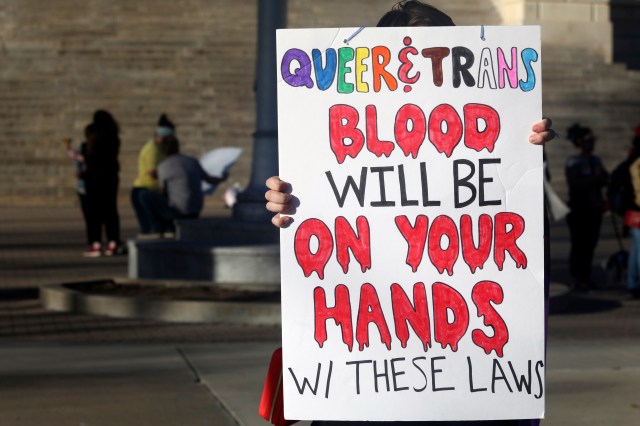
A federal appeals panel rocked but did not knock down a West Virginia law forbidding the participation of transgender athletes on school sports teams.
The narrowly tailored ruling concluded the state law violates the rights of a middle school track and cross country runner who identifies as a girl and uses puberty blocking medication. The majority determined her rights have been violated under federal Title IX, which prohibits sex-based discrimination in any school or education program that receives federal funds.
But the appeals ruling did not fully invalidate West Virginia’s law. That leaves school districts and teams in a murky position when other transgender girls try out for teams.

“Like you, we are still reviewing and discussing with our legal, to see how if at all if affects our current status,” David Price, executive director of the West Virginia Secondary Schools Activities Commission, said in an email this week in response to MetroNews questions about how the appeals ruling might affect situations still to come.

The case decided by the Fourth Circuit Court of Appeals focused on middle schooler Becky Pepper-Jackson, who was born male but identified as a girl from a very young age. By third grade, she was living as a girl at home and told her mother and father she did not want to keep going to school dressed as a boy.
More recently, she was diagnosed with gender dysphoria and had been receiving puberty-delaying treatment for almost a year when West Virginia passed a bill affecting transgender athletes. Her federal lawsuit, where she is referred to as B.P.J., was aimed at being able to participate on the cross-country and track teams at Bridgeport Middle School.
“The question before us is whether the Act may lawfully be applied to prevent a 13-year-old transgender girl who takes puberty blocking medication and has publicly identified as a girl since the third grade from participating in her school’s cross country and track teams,” Judge Toby Heytons wrote in the majority opinion. “We hold it cannot.”
The majority ruling included a caveat to be clear that the ruling does not cover all instances of transgender athletes participating on sports teams.
“We do not hold that government officials are forbidden from creating separate sports teams for boys and girls or that they lack power to police the line drawn between those teams. We also do not hold that Title IX requires schools to allow every transgender girl to play on girls teams, regardless of whether they have gone through puberty and experienced elevated levels of circulating testosterone.”

Chris Geidner, a journalist who writes Law Dork analysis of significant court issues, took note of the narrow scope of the West Virginia case in a recent post.
As Geidner wrote, “B.P.J. was not seeking to end the sex-based sports classifications. She was not even seeking to have the law declared ‘facially’ invalid — meaning, in all circumstances. She, instead, brought an ‘as-applied’ challenge.
Geidner then quoted from the majority ruling by Judge Heytens: “[S]he challenges [the Act] only as applied to her and seeks an injunction that would prevent the defendants from enforcing it against her.”
Yet the case would have likely ramifications for transgender athletes under similar circumstances, Geidner said in a telephone interview with MetroNews.
“There’s enough in the opinion that makes it difficult for anyone within West Virginia to argue that someone like Becky – so someone who has not gone through puberty and is on puberty blockers, and I don’t think it’s as essential to the opinion, but the fact that there was a long-time social transition, including her presentation in school as a female – if a plaintiff or student brings that to a school district they would not be in a good position to reject that trans girl to play on a girls team,” Geidner said.
The circumstances in such cases could be the basis for their own court cases, but Geidner said school officials would be foolish to wind up in court battles.
“I don’t know if they all need to go to court, and I don’t know that they all should. If nothing else, as a steward of the public’s money if a student comes to a school district whose facts look awful close to the fact’s of Becky’s case, I would say that you’re basically throwing money away if you challenge it.”
He acknowledged that the majority opinion does not invite all circumstances for transgender athletes participating on sports teams.
“Let’s say, as a hypothetical, somebody plays on the boys team in ninth and tenth grade and over the summer says ‘I’m planning to arrive in school in the fall as Janice and want to play on the girls team.’ This does not resolve that,” he said.
At least 24 states have passed laws focused on transgender athletes on sports teams. Several of those have risen through the court system. Other judges have temporarily blocked enforcement in Arizona, Idaho and Utah.
The Biden administration finalized new rules Friday on Title IX, but the updated regulations do not take on the issue of transgender athletes.
West Virginia passed its law in 2021, joining dozens of states placing restrictions on transgender athletes’ participation on sports teams.
House Bill 3293 defines male and female “based solely on the individual’s reproductive biology and genetics at birth.” A key part says, “Athletic teams or sports designated for females, women, or girls shall not be open to students of the male sex where selection for such teams is based upon competitive skill or the activity involved is a contact sport.”
Appeals Judge Heytens wrote that offering Becky Pepper-Jackson a “choice” between not participating in sports and participating only on boys teams “is no real choice at all.”
“The defendants cannot expect that B.P.J. will countermand her social transition, her medical treatment, and all the work she has done with her schools, teachers, and coaches for nearly half her life by introducing herself to teammates, coaches, and even opponents as a boy,” Heytens wrote.
As Becky Pepper-Jackson’s court case wound through the federal system, she was able to continue participating on her middle school teams. In particular, she excelled at shot put and discus.
The Harrison County middle school track championship was last Thursday, just two days after the court ruling. Records show that Becky Pepper-Jackson won the shot put by a significant margin, three feet difference. She placed second in the discus.
The middle school meet wound up in the national spotlight when the conservative sports publication OutKick produced an article that included video of middle schoolers with their faces blurred stepping out of the shot put competition. The five middle schoolers who stepped out were recorded as “no distance.”
So, on the athletic field and in the court system, the conflict is primed to continue.

Attorney General Patrick Morrisey, whose office defended West Virginia’s law in federal court, agreed the appeals ruling does not invalidate West Virginia’s law. However, Morrisey said there could be consequences beyond this particular case.
“It’s supposed to apply to the specific student. Obviously there will be a lot of people if they are similarly situated, they may cite that or decide to go to court,” Morrisey said last week on MetroNews’ “Talkline.”
More broadly, he said, “the import of this is that this is a very significant setback for the law’s status.”
Morrisey said his office is considering further appeals possibilities that include asking all of the judges of the Fourth Circuit to review the case — or petitioning for consideration by the U.S. Supreme Court.
“We’re analyzing it, but we will be challenging it,” said Morrisey, a Republican candidate for governor.



